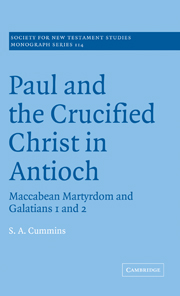Book contents
- Frontmatter
- Contents
- Preface
- List of abbreviations
- Introduction
- Part One MACCABEAN MARTYRDOM
- Part Two PAUL AND THE CRUCIFIED CHRIST IN ANTIOCH
- 3 Paul as a paradigm of conformity to Christ: the Galatian context, conceptual framework and autobiography
- 4 Jews and Christians in Antioch
- 5 Paul and the crucified Christ in Antioch: Galatians 2.11–14
- 6 Paul and the crucified Christ in Antioch: Galatians 2.15–21
- Conclusion
- Bibliography
- Index of passages
- Select index of Greek words and phrases
- Index of modern authors
- Select index of names and subjects
3 - Paul as a paradigm of conformity to Christ: the Galatian context, conceptual framework and autobiography
Published online by Cambridge University Press: 22 September 2009
- Frontmatter
- Contents
- Preface
- List of abbreviations
- Introduction
- Part One MACCABEAN MARTYRDOM
- Part Two PAUL AND THE CRUCIFIED CHRIST IN ANTIOCH
- 3 Paul as a paradigm of conformity to Christ: the Galatian context, conceptual framework and autobiography
- 4 Jews and Christians in Antioch
- 5 Paul and the crucified Christ in Antioch: Galatians 2.11–14
- 6 Paul and the crucified Christ in Antioch: Galatians 2.15–21
- Conclusion
- Bibliography
- Index of passages
- Select index of Greek words and phrases
- Index of modern authors
- Select index of names and subjects
Summary
Paul's account of his confrontation with Peter in Antioch (Gal. 2.11–21) climaxes a select autobiographical narrative (Gal. 1.13–2.21) which is itself precipitated by the present crisis amongst his converts in Galatia. Thus, in order to reconstruct an illuminating frame of reference for the later detailed analysis of the Antioch incident, I shall provide here a tripartite examination of its wider context(s). First, I review and then go beyond the consensus position concerning the main features of the Galatian crisis, considering the much neglected but important role of conflict and persecution in Paul's past and present relations with his converts in Galatia. Particular attention is paid to the manner in which the Galatian situation, both in broad outline and in certain of its details, evinces aspects of the Maccabean crisis – though now as redrawn from Paul's standpoint as a zealous Jew who has become a follower of Jesus Christ.
Second, this leads to a consideration of the conceptual framework governing Paul's response to the Galatian crisis. At its most fundamental, it consists of a radical reworking of a Jewish apocalyptic schema – as exemplified by Daniel 7–12 and related texts – in the light of Christ and the Spirit. That is, Messiah Jesus is the long-awaited (but unexpected) Jewish eschatological redeemer, and the Spirit is the sign of the now inaugurated reign of God.
- Type
- Chapter
- Information
- Paul and the Crucified Christ in AntiochMaccabean Martyrdom and Galatians 1 and 2, pp. 93 - 137Publisher: Cambridge University PressPrint publication year: 2001



